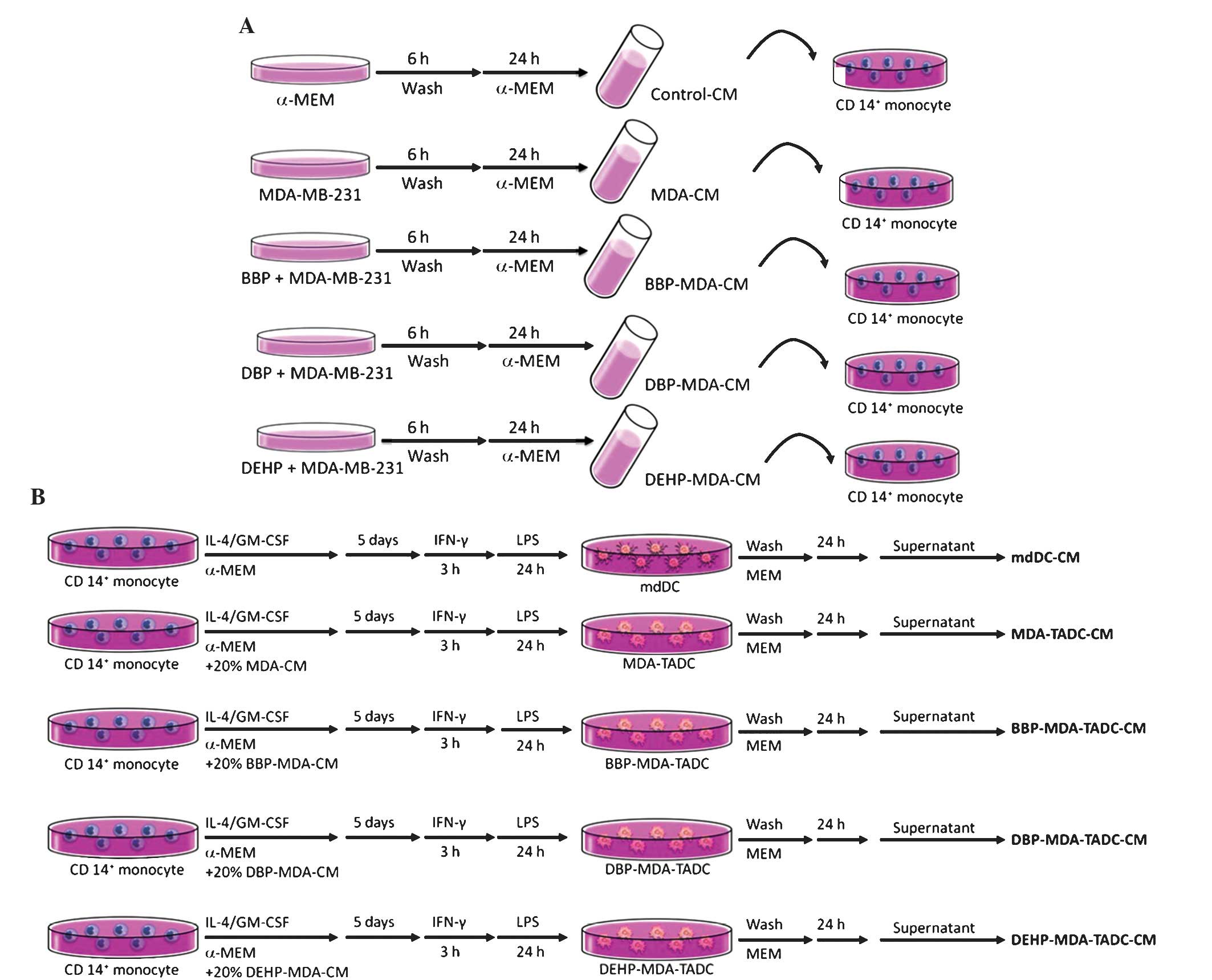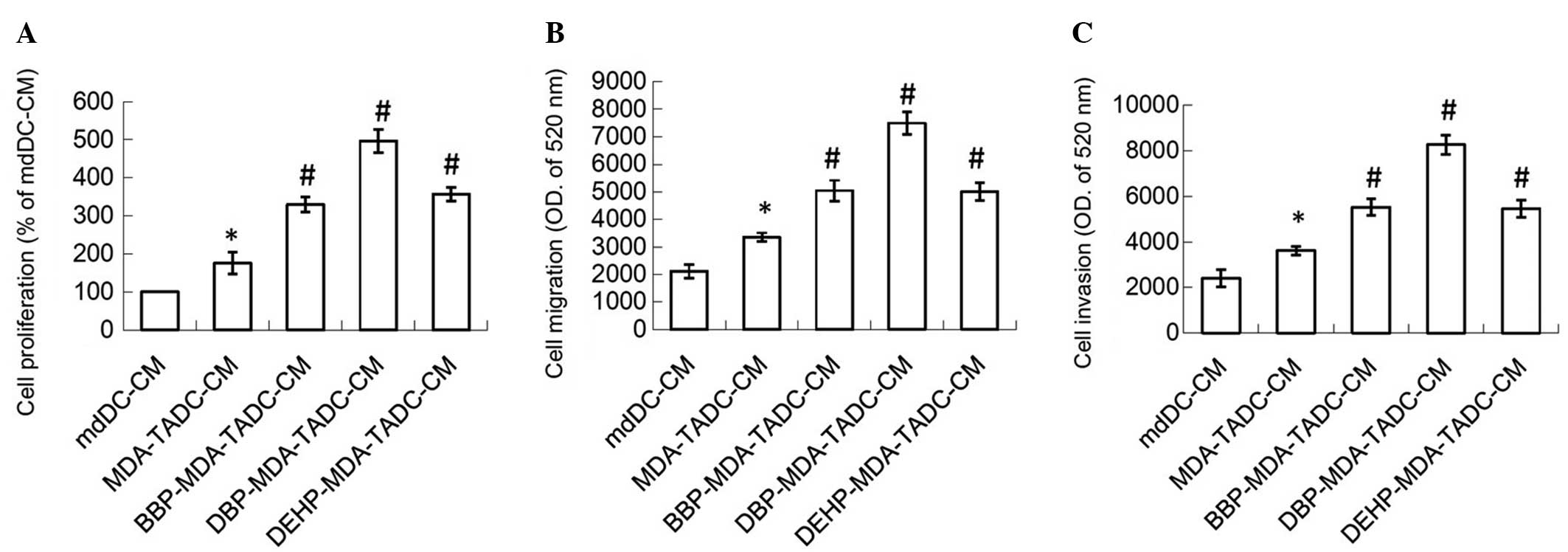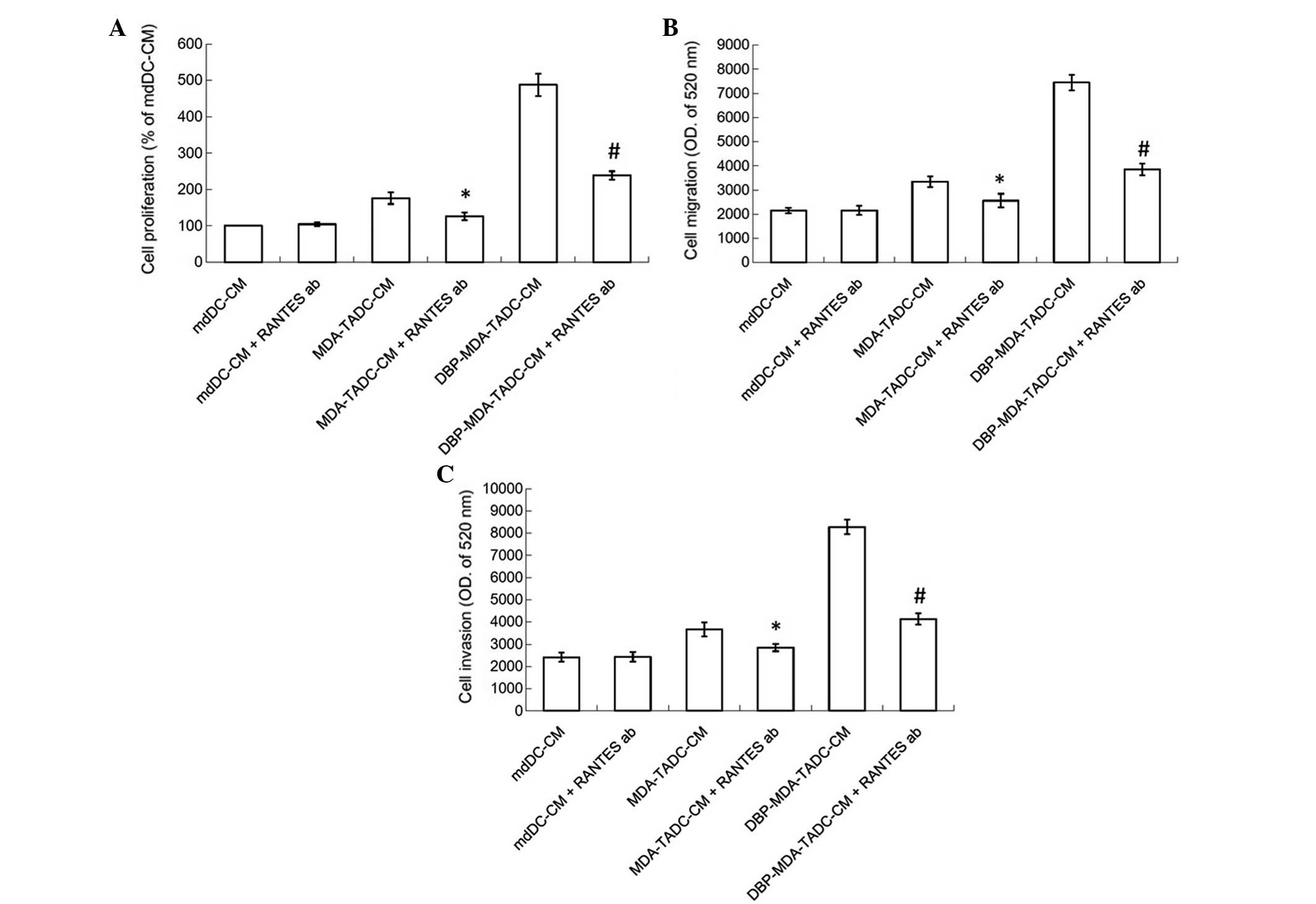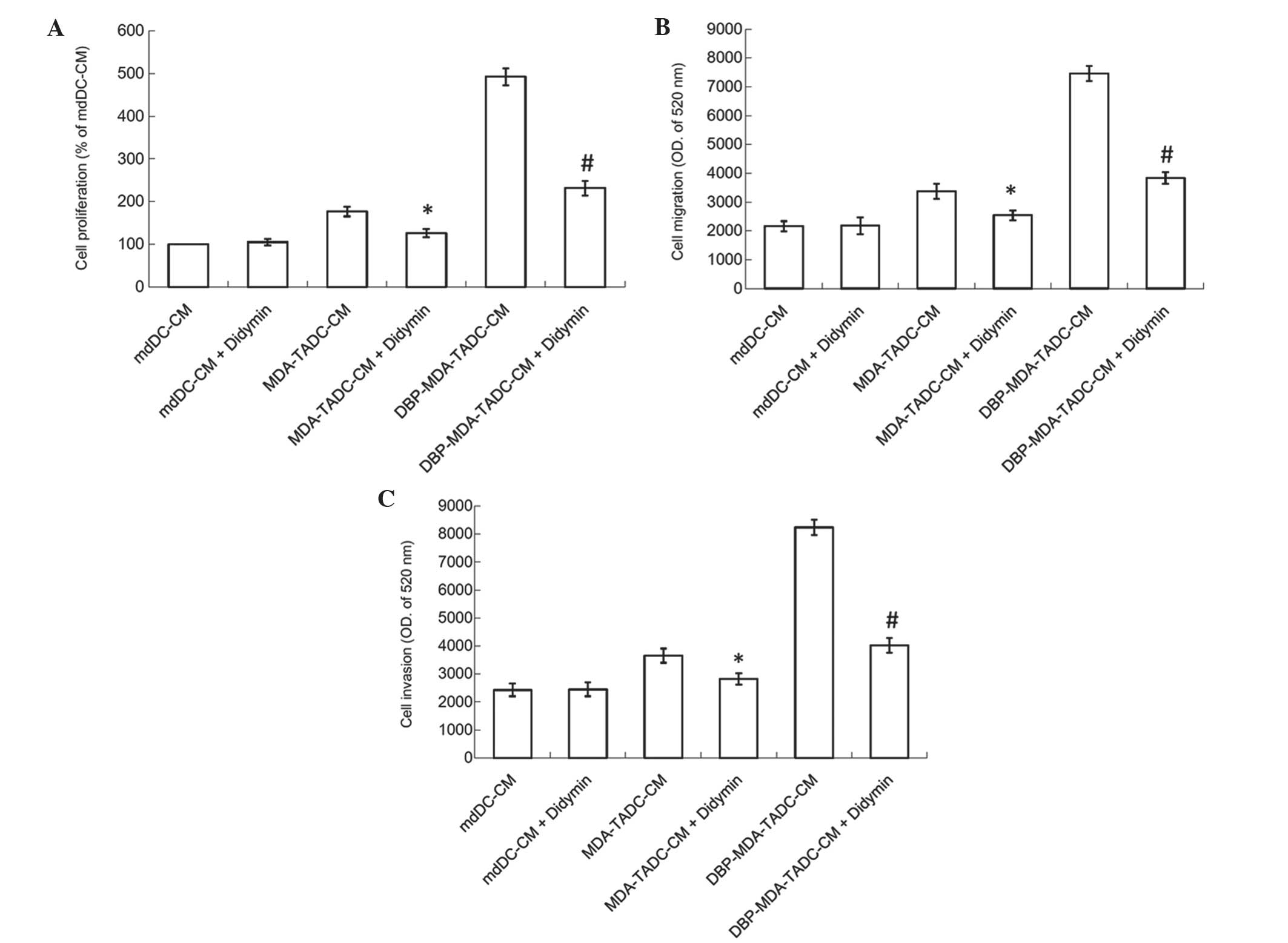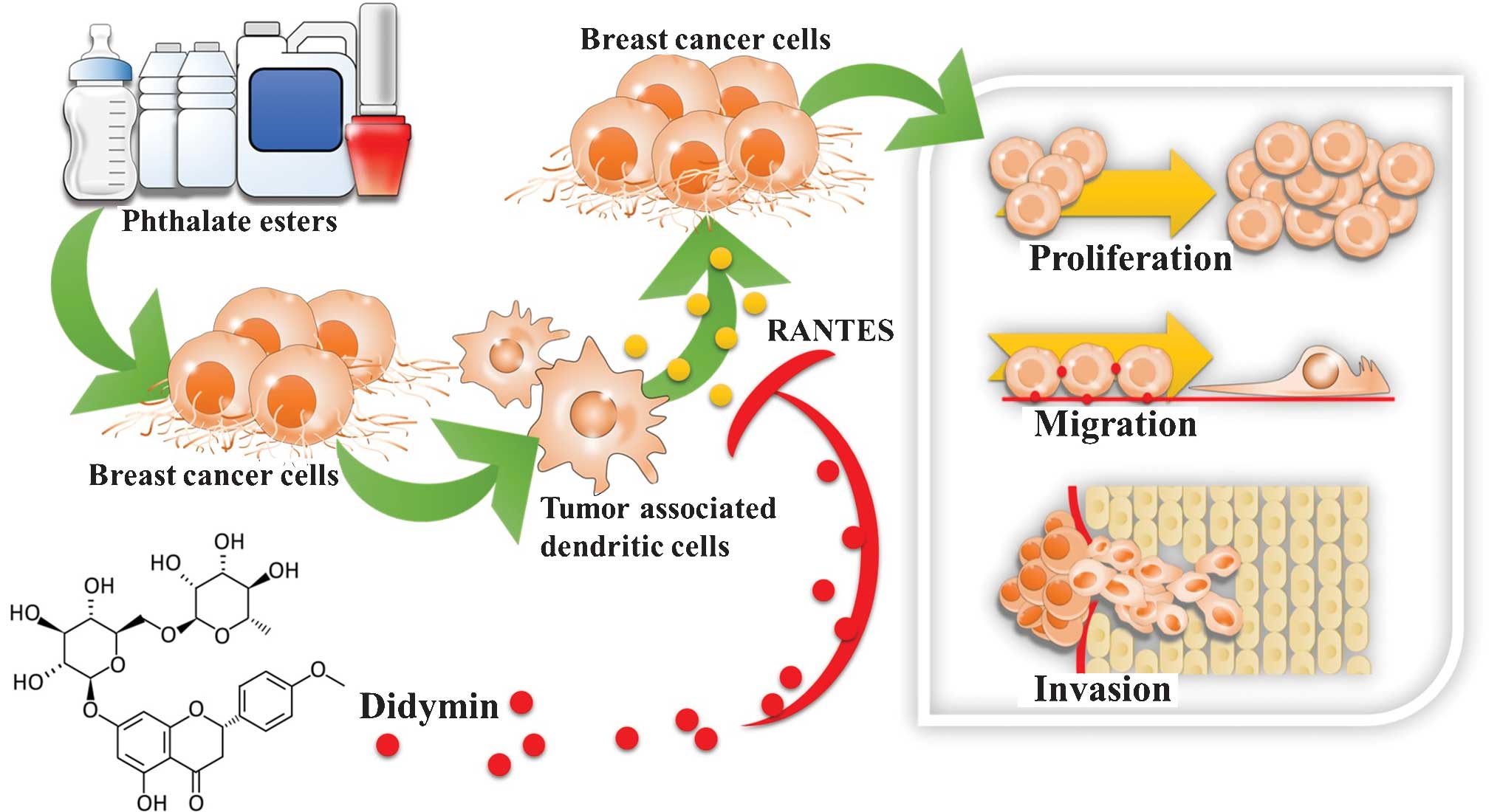|
1
|
Martino-Andrade AJ and Chahoud I:
Reproductive toxicity of phthalate esters. Mol Nutr Food Res.
54:148–157. 2010. View Article : Google Scholar : PubMed/NCBI
|
|
2
|
Ge RS, Chen GR, Tanrikut C and Hardy MP:
Phthalate ester toxicity in Leydig cells, Developmental timing and
dosage considerations. Reprod Toxicol. 23:366–373. 2007. View Article : Google Scholar : PubMed/NCBI
|
|
3
|
López-Carrillo L, Hernández-Ramírez RU,
Calafat AM, Torres-Sánchez L, Galván-Portillo M, Needham LL,
Ruiz-Ramos R and Cebrián ME: Exposure to phthalates and breast
cancer risk in northern Mexico. Environ Health Perspect.
118:539–544. 2010. View Article : Google Scholar : PubMed/NCBI
|
|
4
|
Aschengrau A, Coogan PF, Quinn M and
Cashins LJ: Occupational exposure to estrogenic chemicals and the
occurrence of breast cancer, An exploratory analysis. Am J Ind Med.
34:6–14. 1998. View Article : Google Scholar : PubMed/NCBI
|
|
5
|
Carran M and Shaw IC: New Zealand Malayan
war veterans' exposure to dibutylphthalate is associated with an
increased incidence of cryptorchidism hypospadias and breast cancer
in their children. N Z Med J. 125:52–63. 2012.PubMed/NCBI
|
|
6
|
Sprague BL, Trentham-Dietz A, Hedman CJ,
Wang J, Hemming JD, Hampton JM, Buist DS, Bowles Aiello EJ, Sisney
GS and Burnside ES: Circulating serum xenoestrogens and
mammographic breast density. Breast Cancer Res. 15:R452013.
View Article : Google Scholar : PubMed/NCBI
|
|
7
|
Katoh H, Wang D, Daikoku T, Sun H, Dey SK
and Dubois RN: CXCR2-expressing myeloid-derived suppressor cells
are essential to promote colitis-associated tumorigenesis. Cancer
Cell. 24:631–644. 2013. View Article : Google Scholar : PubMed/NCBI
|
|
8
|
Peltekova VD, Lemire M, Qazi AM, Zaidi SH,
Trinh QM, Bielecki R, Rogers M, Hodgson L, Wang M, D'Souza DJ, et
al: Identification of genes expressed by immune cells of the colon
that are regulated by colorectal cancer-associated variants. Int J
Cancer. 134:2330–2341. 2014. View Article : Google Scholar : PubMed/NCBI
|
|
9
|
Gajewski TF, Schreiber H and Fu YX: Innate
and adaptive immune cells in the tumor microenvironment. Nat
Immunol. 14:1014–1022. 2013. View
Article : Google Scholar : PubMed/NCBI
|
|
10
|
Hsu YL, Huang MS, Cheng DE, Hung JY, Yang
CJ, Chou SH and Kuo PL: Lung tumor-associated dendritic
cell-derived amphiregulin increased cancer progression. J Immunol.
187:1733–1744. 2011. View Article : Google Scholar : PubMed/NCBI
|
|
11
|
Kuo CH, Chen KF, Chou SH, Huang YF, Wu CY,
Cheng DE, Chen YW, Yang CJ, Hung JY and Huang MS: Lung
tumor-associated dendritic cell-derived resistin promoted cancer
progression by increasing Wolf-Hirschhorn syndrome candidate
1/Twist pathway. Carcinogenesis. 34:2600–2609. 2013. View Article : Google Scholar : PubMed/NCBI
|
|
12
|
Gonzalez RM, Daly DS, Tan R, Marks JR and
Zangar RC: Plasma biomarker profiles differ depending on breast
cancer subtype but RANTES is consistently increased. Cancer
Epidemiol Biomarkers Prev. 20:1543–1551. 2011. View Article : Google Scholar : PubMed/NCBI
|
|
13
|
Velasco-Velázquez M and Pestell RG: The
CCL5/CCR5 axis promotes metastasis in basal breast cancer.
Oncoimmunology. 2:e236602013. View Article : Google Scholar : PubMed/NCBI
|
|
14
|
Lv D, Zhang Y, Kim HJ, Zhang L and Ma X:
CCL5 as a potential immunotherapeutic target in triple-negative
breast cancer. Cell Mol Immunol. 10:303–310. 2013. View Article : Google Scholar : PubMed/NCBI
|
|
15
|
Zhang Y, Lv D, Kim HJ, Kurt RA, Bu W, Li Y
and Ma X: A novel role of hematopoietic CCL5 in promoting
triple-negative mammary tumor progression by regulating generation
of myeloid-derived suppressor cells. Cell Res. 23:394–408. 2013.
View Article : Google Scholar : PubMed/NCBI
|
|
16
|
Ash SA, Valchev GI, Looney M, Mhathuna Ni
A, Crowley PD, Gallagher HC and Buggy DJ: Xenon decreases cell
migration and secretion of a pro-angiogenesis factor in breast
adenocarcinoma cells, Comparison with sevoflurane. Br J Anaesth.
113((Suppl 1)): i14–i21. 2014. View Article : Google Scholar : PubMed/NCBI
|
|
17
|
Takemura H, Sakakibara H, Yamazaki S and
Shimoi K: Breast cancer and flavonoids - a role in prevention. Curr
Pharm Des. 19:6125–6132. 2013. View Article : Google Scholar : PubMed/NCBI
|
|
18
|
Donaldson MS: Nutrition and cancer: A
review of the evidence for an anti-cancer diet. Nutr J. 3:192004.
View Article : Google Scholar : PubMed/NCBI
|
|
19
|
Stoner GD and Mukhtar H: Polyphenols as
cancer chemopreventive agents. J Cell Biochem Suppl. 22:169–180.
1995. View Article : Google Scholar : PubMed/NCBI
|
|
20
|
Yang CS, Landau JM, Huang MT and Newmark
HL: Inhibition of carcinogenesis by dietary polyphenolic compounds.
Annu Rev Nutr. 21:381–406. 2001. View Article : Google Scholar : PubMed/NCBI
|
|
21
|
Aggarwal BB and Shishodia S: Molecular
targets of dietary agents for prevention and therapy of cancer.
Biochem Pharmacol. 71:1397–1421. 2006. View Article : Google Scholar : PubMed/NCBI
|
|
22
|
Ramos AM and Aller P: Quercetin decreases
intracellular GSH content and potentiates the apoptotic action of
the antileukemic drug arsenic trioxide in human leukemia cell
lines. Biochem Pharmacol. 75:1912–1923. 2008. View Article : Google Scholar : PubMed/NCBI
|
|
23
|
Calabrò ML, Galtieri V, Cutroneo P,
Tommasini S, Ficarra P and Ficarra R: Study of the extraction
procedure by experimental design and validation of a LC method for
determination of flavonoids in Citrus bergamia juice. J
Pharm Biomed Anal. 35:349–363. 2004. View Article : Google Scholar : PubMed/NCBI
|
|
24
|
Finotti E: DiM ajo D: Influence of
solvents on the antioxidant property of flavonoids. Nahrung.
47:186–187. 2003. View Article : Google Scholar : PubMed/NCBI
|
|
25
|
Mouly P, Gaydou EM and Auffray A:
Simultaneous separation of flavanone glycosides and
polymethoxylated flavones in citrus juices using liquid
chromatography. J Chromatogr A. 800:171–179. 1998. View Article : Google Scholar : PubMed/NCBI
|
|
26
|
Ross SA, Ziska DS, Zhao K and ElSohly MA:
Variance of common flavonoids by brand of grapefruit juice.
Fitoterapia. 71:154–161. 2000. View Article : Google Scholar : PubMed/NCBI
|
|
27
|
Hung JY, Hsu YL, Ko YC, Tsai YM, Yang CJ,
Huang MS and Kuo PL: Didymin, a dietary flavonoid glycoside from
citrus fruits, induces Fas-mediated apoptotic pathway in human
non-small-cell lung cancer cells in vitro and in
vivo. Lung Cancer. 68:366–374. 2010. View Article : Google Scholar : PubMed/NCBI
|
|
28
|
Singhal J, Nagaprashantha LD and Vatsyayan
R: Ashutosh,A wasthi S and Singhal SS: Didymin induces apoptosis by
inhibiting N-Myc and upregulating RKIP in neuroblastoma. Cancer
Prev Res (Phila). 5:473–483. 2012. View Article : Google Scholar : PubMed/NCBI
|
|
29
|
Zeng F, Xie L, Pang X, Liu W, Nie Q and
Zhang X: Complementary eoxyribonucleic acid cloning of avian G0/G1
switch gene 2, and its expression and association with production
traits in chicken. Poult Sci. 90:1548–1554. 2011. View Article : Google Scholar : PubMed/NCBI
|
|
30
|
Bharadwaj U, Li M, Zhang R, Chen C and Yao
Q: Elevated interleukin-6 and G-CSF in human pancreatic cancer cell
conditioned medium suppress dendritic cell differentiation and
activation. Cancer Res. 67:5479–5488. 2007. View Article : Google Scholar : PubMed/NCBI
|
|
31
|
Watkins SK, Zhu Z, Riboldi E,
Shafer-Weaver KA, Stagliano KE, Sklavos MM, Ambs S, Yagita H and
Hurwitz AA: FOXO3 programs tumor-associated DCs to become
tolerogenic in human and murine prostate cancer. J Clin Invest.
121:1361–1372. 2011. View
Article : Google Scholar : PubMed/NCBI
|
|
32
|
Hsieh TH, Tsai CF, Hsu CY, Kuo PL, Hsi E,
Suen JL, Hung CH, Lee JN, Chai CY, Wang SC and Tsai EM: n-Butyl
benzyl phthalate promotes breast cancer progression by inducing
expression of lymphoid enhancer factor 1. PLoS One. 7:e427502012.
View Article : Google Scholar : PubMed/NCBI
|
|
33
|
Hsieh TH, Tsai CF, Hsu CY, Kuo PL, Lee JN,
Chai CY, Wang SC and Tsai EM: Phthalates induce proliferation and
invasiveness of estrogen receptor-negative breast cancer through
the AhR/HDAC6/c-Myc signaling pathway. FASEB J. 26:778–787. 2012.
View Article : Google Scholar : PubMed/NCBI
|
|
34
|
Chen FP and Chien MH: Lower concentrations
of phthalates induce proliferation in human breast cancer cells.
Climacteric. 17:377–384. 2014. View Article : Google Scholar : PubMed/NCBI
|
|
35
|
Hsu YL, Tsai EM, Hou MF, Wang TN, Hung JY
and Kuo PL: Obtusifolin suppresses phthalate esters-induced breast
cancer bone metastasis by targeting parathyroid hormone-related
protein. J Agric Food Chem. 62:11933–11940. 2014. View Article : Google Scholar : PubMed/NCBI
|
|
36
|
Tsai MJ, Chang WA, Huang MS and Kuo PL:
Tumor microenvironment, A new treatment target for cancer. ISRN
Biochem. 2014:3519592014. View Article : Google Scholar : PubMed/NCBI
|
|
37
|
Liu Y, Han ZP, Zhang SS, Jing YY, Bu XX,
Wang CY, Sun K, Jiang GC, Zhao X, Li R, et al: Effects of
inflammatory factors on mesenchymal stem cells and their role in
the promotion of tumor angiogenesis in colon cancer. J Biol Chem.
286:25007–25015. 2011. View Article : Google Scholar : PubMed/NCBI
|
|
38
|
Luo YP, Zhou H, Krueger J, Kaplan C, Liao
D, Markowitz D, Liu C, Chen T, Chuang TH, Xiang R and Reisfeld RA:
The role of proto-oncogene Fra-1 in remodeling the tumor
microenvironment in support of breast tumor cell invasion and
progression. Oncogene. 29:662–673. 2010. View Article : Google Scholar : PubMed/NCBI
|
|
39
|
Hsu YL, Hou MF, Kuo PL, Huang YF and Tsai
EM: Breast tumor-associated osteoblast-derived CXCL5 increases
cancer progression by ERK/MSK1/Elk-1/snail signaling pathway.
Oncogene. 32:4436–4447. 2013. View Article : Google Scholar : PubMed/NCBI
|
|
40
|
Chang LY, Lin YC, Mahalingam J, Huang CT,
Chen TW, Kang CW, Peng HM, Chu YY, Chiang JM, Dutta A, et al:
Tumor-derived chemokine CCL5 enhances TGF-β-mediated killing of
CD8(+) T cells in colon cancer by T-regulatory cells. Cancer Res.
72:1092–1102. 2012. View Article : Google Scholar : PubMed/NCBI
|
|
41
|
Soria G, Ofri-Shahak M, Haas I,
Yaal-Hahoshen N, Leider-Trejo L, Leibovich-Rivkin T, Weitzenfeld P,
Meshel T, Shabtai E, Gutman M and Ben-Baruch A: Inflammatory
mediators in breast cancer. Coordinated expression of TNFα &
IL-1β with CCL2 & CCL5 and effects on epithelial-to-mesenchymal
transition. BMC Cancer. 11:1302011. View Article : Google Scholar : PubMed/NCBI
|
|
42
|
Borczuk AC, Papanikolaou N, Toonkel RL,
Sole M, Gorenstein LA, Ginsburg ME, Sonett JR, Friedman RA and
Powell CA: Lung adenocarcinoma invasion in TGFbetaRII-deficient
cells is mediated by CCL5/RANTES. Oncogene. 27:557–564. 2008.
View Article : Google Scholar : PubMed/NCBI
|
|
43
|
Mi Z, Bhattacharya SD, Kim VM, Guo H,
Talbot LJ and Kuo PC: Osteopontin promotes CCL5-mesenchymal stromal
cell-mediated breast cancer metastasis. Carcinogenesis. 32:477–487.
2011. View Article : Google Scholar : PubMed/NCBI
|
|
44
|
Trellakis S, Bruderek K, Dumitru CA,
Gholaman H, Gu X, Bankfalvi A, Scherag A, Hütte J, Dominas N,
Lehnerdt GF, et al: Polymorphonuclear granulocytes in human head
and neck cancer: Enhanced inflammatory activity, modulation by
cancer cells and expansion in advanced disease. Int J Cancer.
129:2183–2193. 2011. View Article : Google Scholar : PubMed/NCBI
|
|
45
|
Jiao X, Katiyar S, Willmarth NE, Liu M, Ma
X, Flomenberg N, Lisanti MP and Pestell RG: c-Jun induces mammary
epithelial cellular invasion and breast cancer stem cell expansion.
J Biol Chem. 285:8218–8226. 2010. View Article : Google Scholar : PubMed/NCBI
|
|
46
|
Yi EH, Lee CS, Lee JK, Lee YJ, Shin MK,
Cho CH, Kang KW, Lee JW, Han W, Noh DY, et al: STAT3-RANTES
autocrine signaling is essential for tamoxifen resistance in human
breast cancer cells. Mol Cancer Res. 11:31–42. 2013. View Article : Google Scholar : PubMed/NCBI
|















